- Home
- Jane Arbor
Consulting Surgeon Page 15
Consulting Surgeon Read online
Page 15
“Well, we did—if only for the prospect of seeing the last of her one day. And I thought I was a nurse on a surgical ward—not a trick-cyclist.” There was a stout hint of rebellion in Nurse Freedom’s voice, and Ursula managed an answering smile.
“A robust attitude to the job which I can’t help envying, Freedom,” she said ruefully.
“As if you needed to envy anyone’s qualities on this job, Sister!” was the loyal reply. But Nurse Freedom, fetching her cloak and going off duty remained puzzled by a dejection which she had never seen Sister give way to before.
“It’s just not like her to be unable to cope,” she confided to Nurse Bates, her bosom crony from Miller ward, when they met at lunch.
“Could be she has quarrelled with her boy friend,” offered Nurse Bates laconically. “Eats into the system, that does.”
“Could be! It could not! Sister Craig isn’t interested in men!” The withering glance which accompanied the words ended the discussion forthwith.
On the ward Ursula went mechanically about her duties, driving herself to attend meticulously to every possible detail, lest neglect of a single one should betray Matthew’s trust still further.
For that was the self-reproach that beat relentlessly in her thoughts. In allowing Miss Calcum to leave hospital she had failed Matthew. Nowhere but in her work had he appreciated her. But there he had trusted and believed in her implicitly. And in that, her only value to him, she had failed.
This was visiting today, and though that meant comparative ease for the junior nurses, for the sister of any ward it always brought a continual busyness. Ursula dealt with one visitor after another. Some came to her office shyly to ask questions; others brought a string of complaints; others again came anxious to the ward and left it completely reassured.
She did not know—though she would have been infinitely grateful if she had—that the majority verdict of the visitors to Christian Shere ward was always: “That Sister Craig—is so nice. Never minds listening to what you have to tell her. Tells you all she can too. Somehow makes you feel she really wants to understand...”
When the last visitor had gone there were the patients’ teas to be seen to; the probationers dealt with these, but then there were the dressings which took her right through until seven, when the night staff took over.
Back in her own room in the nurses’ quarter she was irresolute whether to go to the dining room as usual or to go for a walk instead.
The night—inclined to fogginess after the still day—was uninviting, but her throat felt tight, and she doubted her ability either to eat or talk. She would content herself with the optional cocoa and biscuits at ten and she would go out now. She would not bother to change. She would take off her apron and throw her cloak over her uniform.
She took the Downs road that climbed past Shere Court. Another half mile or so beyond the house the road dwindled to little more than a track, but, confident that she knew the way she meant to take, she trudged along in the wreathing fog, her thoughts intent only upon the self-accusation that drummed continually at the forefront of her mind.
What else could she have done to keep Miss Calcum’s confidence? If she had been wise enough or had chosen her words better, could she have been less direct about Sarah Caspar, but yet have ensured that the child was in future to be safe from the soured, bitter tongue?
Or had the damage been done further back still? Had she ever really understood—as, strangely, Matthew had seemed to do almost at once—that deep, fundamental need of the lonely woman to be loved, to be wanted, to belong?
Tomorrow, at latest, there would be a “carpet”—the hospital equivalent of a court martial. Matron would want to know every detail of why and how Miss Calcum had discharged herself without her acting surgeon’s consent. There would be questions and explanations, but because she knew herself sure of justice, Ursula hardly feared the prospect. It was Matthew who had believed her equal to the task he had set her; Matthew whom she had failed; Matthew who would eventually judge her by the rare standard of perfection which he set himself and expected of her.
Suddenly she checked, realizing too late how swiftly the fog had thickened about her, and that she did not now know in which direction she faced.
South towards the sea? Northward over the Downs? Had she turned in her tracks—once, twice or at all? The impenetrable grey curtain gave no clue.
She drew her cloak more closely about her, stood still and tried to lay a calming hold upon her raw nerves.
It was said that people lost in fog tended to walk in circles. Well, there should still be some clue to direction. Somewhere the fog must surely be lightened by the night glare from the town. It was there, wasn’t it? No, over there. But her eyes smarted with staring, and she listened for the dull boom of the sea instead.
At last she heard it, took a step towards it, then remembered the befuddling effect of fog upon sound and checked again. And realized in an absurd surge of panic that only by a supreme effort of will would she make a choice at all.
Resolutely she took the necessary grip upon herself and faced blindly into the fog, though she knew that she might walk for miles over the springy turf of the Downs before coming upon a house, a guiding light, a roadway.
A road ... Sheer surprise checked her again as she felt the metalled surface unyieldingly beneath her feet. She groped forward and stamped hard upon it, reassuring herself that it was still there, and was more than a yard wide. She stamped again—and believed at first that she heard the other footsteps only as the echo of her own.
Then she listened. The footsteps sounded nearer, a firm, resolute tramp down the road in her direction. Gratefully, unthinkingly, she flung herself towards them—and ran straight into Matthew Lingard’s arms.
Taken completely by surprise, he repulsed her to arm’s length. Then, with a hand firmly about her wrist, he drew her closer, peering into her face.
“Ursula!” His recognition of her had been just in time to check the tremulous “Matthew!” upon her own lips. He went on to demand: “Why are you out on such a night? Where were you going?”
“For a walk.” He had released her wrist and seemed to be standing in judgment over her—as always, she thought.
“In fog of this thickness? You must be mad. Do you know where you are?”
“Not really. I’ve been walking for a long time and—and thinking. I’d lost sense of direction, I found. What road is this?”
“The main one from Halliwell into Sheremouth. About five miles out. Three at least from hospital.”
She gasped with surprise. “Halliwell? Then I was going north!”
“Didn’t you mean to?” He seemed indifferent to her answer and went on: “You are still in uniform. Does that mean you came straight off the ward?”
“Yes.”
“Haven’t you had a meal?”
“No, I wasn’t hungry.”
He touched the front of her cloak. “You are soaking. You’d better come along with me to the Court. It’s the nearest shelter now, and I was making for it. I was on my return journey from my fishing holiday in the west country, but I ran unexpectedly into this and had to abandon the car a couple of miles back. I argued that Aunt Lucy would give me a meal and that I could phone from there for a taxi into the town. I could drop you at hospital on the way down, but meanwhile you should beg a change of things from Aunt Lucy. Averil could probably rig you up.”
“It doesn’t matter,” Ursula protested. “And I ought to get back. I didn’t take an evening pass.”
“You’ll come to the Court first anyway.” His tone brooked no argument and she turned to walk at his side.
“Did you have a good holiday?” It seemed the least dangerous subject to broach.
“Very, thanks. I was solo, and on such a trip that suits me. But by the merest coincidence I ran across a colleague—Bayert—at Ross-on-Wye. He had been exploring Symonds Yat and the Forest of Dean.”
“Mr. Bayert?”
“
Yes.” He paused. Then: “By the way, why did you find it necessary to allow me to believe the fiction of your engagement to the Professor?”
She caught her breath. “You know that it was a fiction?”
“I do now. Coralie happened to hint at it, and Bayert confirmed that it had been no more than a part of his treatment, when I asked him. Why did you not tell me?”
“You seemed determined to believe it. What’s more, to presume to judge my whole character upon it!”
“You resented that?”
“Bitterly, I’m afraid. After that, pride wouldn’t let me enlighten you.”
“The possibility that I might not want to believe it didn’t matter to you? You saw it merely as my intolerable interference?”
“It appeared so, yes.”
“No more than that? I see.” Though she could not see his face she thought she could sense the very set of his mind against her.
At Shere Court there was a warm welcome for them both from Mrs. Damon. With the minimum of questioning she whisked Ursula off to “Ursula’s room,” superintended the discarding of her wet uniform and wrapped her in a satin housecoat of her own.
“I’ll have your things dried, and meanwhile there’ll be supper in Rupert’s study—it is cosier than the dining room. Come down when you are ready, dear, won’t you?” And she went to seek out Matthew.
She found him already in her late husband’s study and announced with gentle imperiousness: “You’ll have to telephone hospital, Matthew. I’m keeping Ursula here tonight. She is worn out.”
“She won’t agree to that, though she needs a meal and a rest, certainly—”
“More than that, Matthew.”
He looked up in surprise. “More than that? What do you mean?”
“I said she was worn out and I meant it. And not merely by the strain of getting herself lost in a fog. You have only to look at her, Matthew!—her drawn, peaked face, that haunted look in her eyes. She is a different person from when I saw her last—at the Centenary Ball.”
“Are you suggesting that she has been overworking?” he asked carefully.
“Perhaps. But over-worrying, more likely. Can’t you do something about it?”
“What can I do, except advise her to report sick?”
There was an edge to his voice, but her frailty remained undaunted. She said quietly: “Is that all? Doesn’t—love suggest anything more?”
A strange quietness fell between them. Then: “How long have you known?”
“I haven’t known, dear. I’ve only hoped. How long has it been, Matthew?”
“Probably since the moment I first laid eyes upon her.”
“Before you brought her to me?”
“Yes, before that.”
“Then—?” Mrs. Damon broke off, her smile quiet and secret.
“Then—what?”
“Nothing. Except that, that night, I thought you had brought her to me as the girl who would be your bride. You had promised, remember? So I wasn’t wrong—only premature.”
He put out a hand to her. “Not wrong even then, Aunt Lucy. But—‘Man proposes...’ You know the rest. And it hasn’t worked out that way yet.”
“But you’ll tell her now, won’t you? You owe that to her.”
He glanced at the two covers laid at the table, and the corner of his mouth tilted. “I might have found the courage to do it tonight, if you weren’t intent on keeping her from me.”
Mrs. Damon’s eyes followed his. Then they twinkled. “On the contrary, she will be down at any minute. When Averil is out it’s my habit to have a light supper on a tray in my room. That second place at the table isn’t for me...”
She left him staring at the door which closed softly behind her. But a moment later he went to the telephone, dialled the hospital number and spoke crisply into the receiver. He had just finished when Ursula joined him.
She halted at seeing him alone. “Oh, I thought Mrs. Damon—Were you phoning for our taxi?”
He shook his head. “Aunt Lucy has gone to her room. And I can call a taxi later.”
“I ought to be getting back.”
“We don’t want you to go back tonight. I’ve phoned Matron and it is all settled. Come over to the fire.” He held out a hand to her and knew an aching apprehension lest she should ignore it.
But with a new dull obedience she laid her fingers in his, and when they stood side by side at the fire she did not withdraw them.
After a moment he said: “What is wrong, Ursula? You are very tired, aren’t you?” His voice was gentle, but his eyes were insistent, demanding an answer that was not an evasion.
“I—” But his gentleness destroyed her, as she had always known it might, and she snatched her hand from his, setting the back of it against her lips in a desperate effort at control.
He drew her hand down and imprisoned it and the other one between his own. “Tell me,” he insisted. “Is it the ward? Anything personal? You can trust me, you know—”
For a moment there was silence. Then in a high, unnatural voice she began: “It’s something that you declared I could know nothing of—failure! I’ve failed! I’ve failed you. You wanted to succeed in that case, and now every chance you had is destroyed—”
“Won’t you explain?”
She told him then, the words tumbling from her lips in an agony of self-reproach. He listened to the end, then set a knuckle beneath her chin, making her face him.
He said: “My dear, we must fail sometimes. Didn’t my extremely cautious approach to that case tell you that I feared we might?”
“You needn’t have done. You had arrived at the most likely cause. You believed you would succeed.”
“And what if I did? Do you suppose that I have never before had a case into which I put all I knew, telling myself that it should not escape me—and then had to accept failure in the end? Do you think me incapable of learning from failures? That they aren’t even a little good for me—as they should be for you!” His smile invited hers.
“This was my failure, not yours,” she insisted with stubborn weariness.
“No. All along I feared that it might be too late to try out my theory. But I’ve a feeling that with that particular patient I may even get a second chance. I’ve a feeling that, for all her dissatisfaction, the suspicion that through hastiness she may have missed something could bring Emily Calcum back to my clinic, even if not into hospital again. So do you think you could leave the future responsibility of her to me?”
Now she did smile tremulously. “You make it too easy for me,” she said.
At that his control broke. “Too easy! Have you ever allowed me to ease any path of yours?”
“I—never thought you wanted to.”
“And when I’ve longed to, what sort of barriers have you always flung up? You, the perfectionist, intimating firmly but so very gently that there was nothing you could not achieve—alone! I loved you—and your cool efficiency needed nothing of me; that secure self-sufficiency of yours eluded everything I tried to lay at your feet!”
“You seemed to be trying to belittle everything I valued,” she was stung to retort.
“You challenged me, and that was my small pride longing to hit back. Later I became more humble and began deliberately to probe for the chink in your armor. Had you ever known love—and lost it? What need, if any, was driving you to marry the Professor when I was convinced you did not love him? What hunger of your heart might your lips reveal if I dared everything and kissed you? In turn I tried them all—and achieved less than nothing.”
In a low voice she said: “I’ve loved you too.” On her own lips the words held a wonder equal to hearing them from his.
“Oh, my very dear—!”
She went on dully: “But it wasn’t any good. A woman dare not allow herself to need anything of—another woman’s man.”
“I have belonged to no other woman!”
“To Averil, surely?”
“My dearest, never to Averil!
By no word nor deed nor willing touch!”
“She believed so. She told Coralie you were engaged.”
His jaw was set about by a hard line. “Averil can convince herself of anything—for any purpose of her own, or for the conviction of anyone else. But if I had ever been attracted to her, don’t you suppose it would have been enough to know that she had made Foster unhappy while he was alive and had deserted him when he was dead?”
“You knew that?”
“I had guessed most of it. And when she announced airily that she thought she would marry Dallant, I made her admit it. Lucy knows it too, and I believe is almost thankful that Foster died when he did—while he still loved her.” Matthew paused before adding with an oblique glance: “For me, Averil was Foster’s wife, then his widow—nothing more. But all the same, she has one quality which you, my staunchly lonely fighter, have not acquired yet!”
“Has she? What is it?” For all the new wonder opening before her, a tiny stab of jealousy of Averil could still hurt.
“Well, she appeals, however studiedly, to a man’s protection. I don’t think you fully realize that deep, male need to shield. Until tonight you’ve never shown you needed shielding from anything!”
She laughed happily and leaned back against him. “Until tonight—only from your scorn, Matthew. But from that—most of the time!”
“Never from my scorn,” he murmured in protest, his lips against her hair. “Only from my reluctance to admit that in one woman there could possibly be so much for me—and that withheld!”
Even now it seemed that words could still spurt to argument between them. Amused at the thought, she twisted about in his arms to ask: “Shall we always contrive to strike sparks from each other, you and I?”
For answer he set his mouth to hers. When he spoke at last it was in deliberate misunderstanding. “No mere sparks for us, my sweet. Tonight we are lighting a flame...”

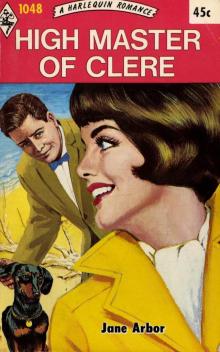 High Master of Clere
High Master of Clere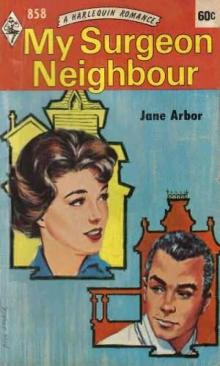 My Surgeon Neighbour
My Surgeon Neighbour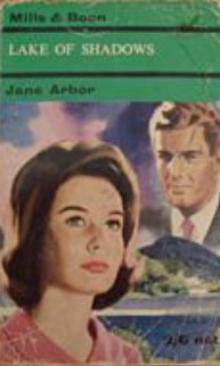 Lake of Shadows
Lake of Shadows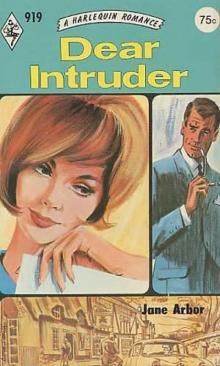 Dear Intruder
Dear Intruder Flash of Emerald
Flash of Emerald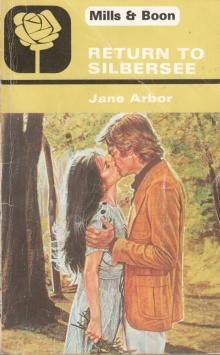 Return to Silbersee
Return to Silbersee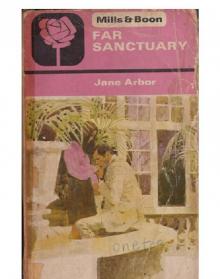 Far Sanctuary
Far Sanctuary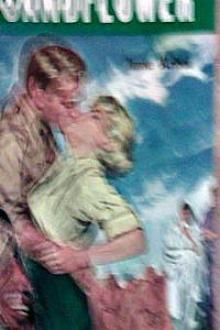 Sandflower
Sandflower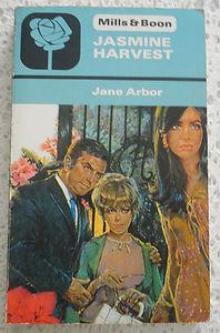 Jasmine Harvest
Jasmine Harvest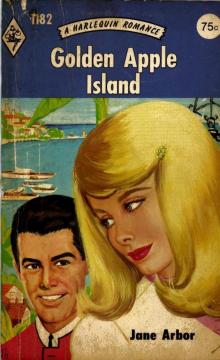 Golden Apple Island
Golden Apple Island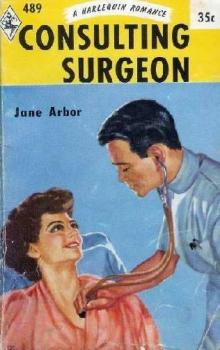 Consulting Surgeon
Consulting Surgeon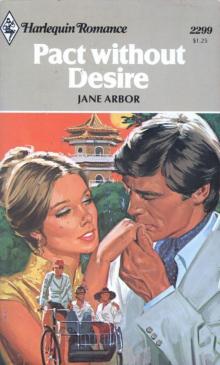 Pact without desire
Pact without desire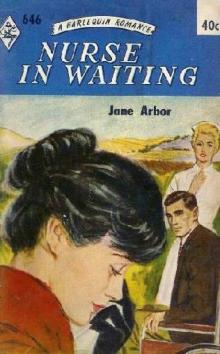 Nurse in Waiting
Nurse in Waiting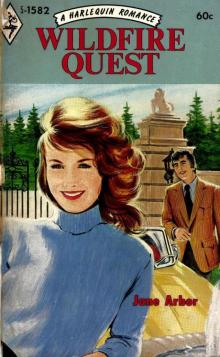 Wildfire Quest
Wildfire Quest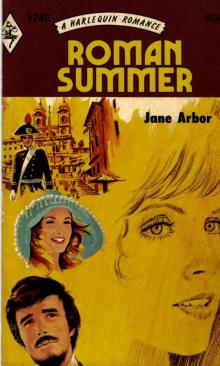 Roman Summer
Roman Summer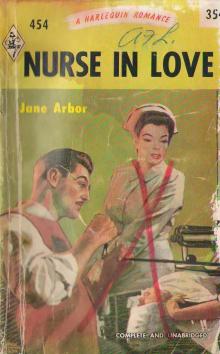 Nurse in Love
Nurse in Love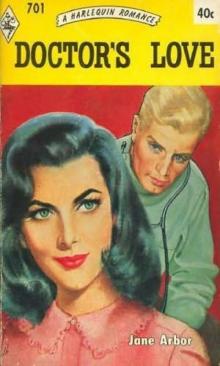 Doctor's Love
Doctor's Love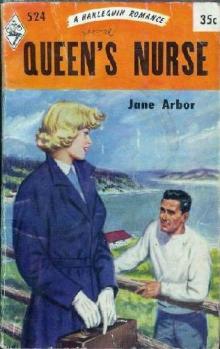 Queen's Nurse
Queen's Nurse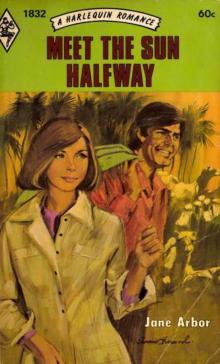 Meet the Sun Halfway
Meet the Sun Halfway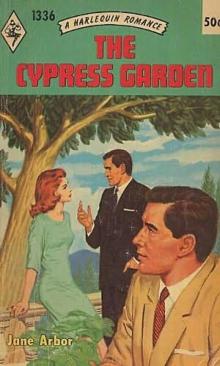 The Cypress Garden
The Cypress Garden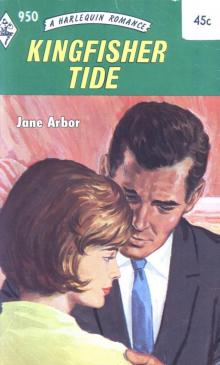 Kingfisher Tide
Kingfisher Tide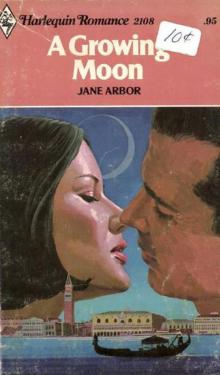 A Growing Moon
A Growing Moon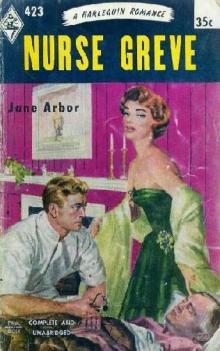 Nurse Greve
Nurse Greve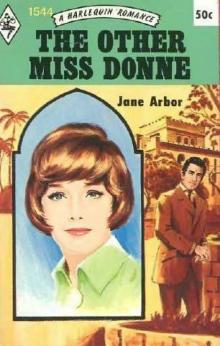 The Other Miss Donne
The Other Miss Donne